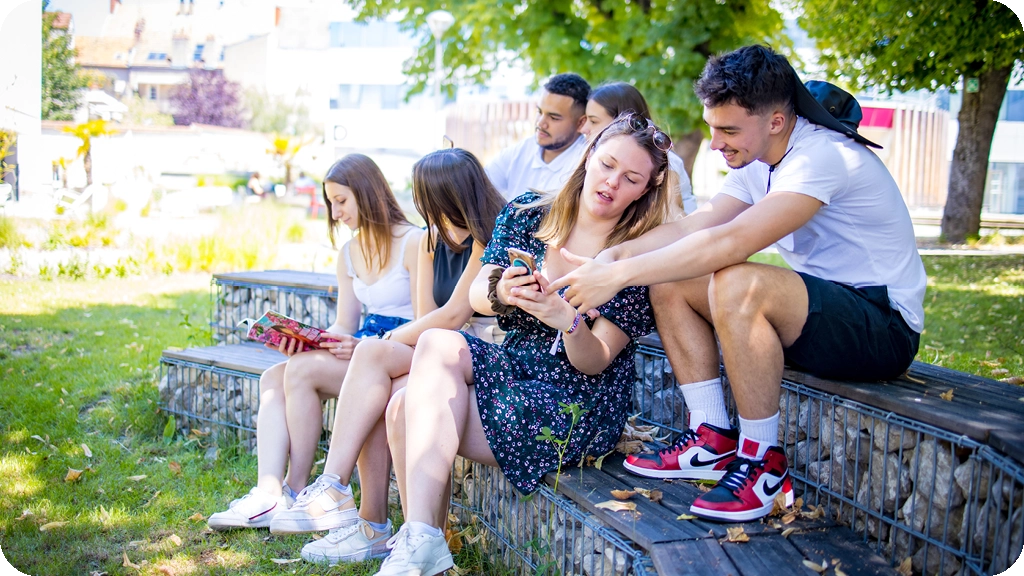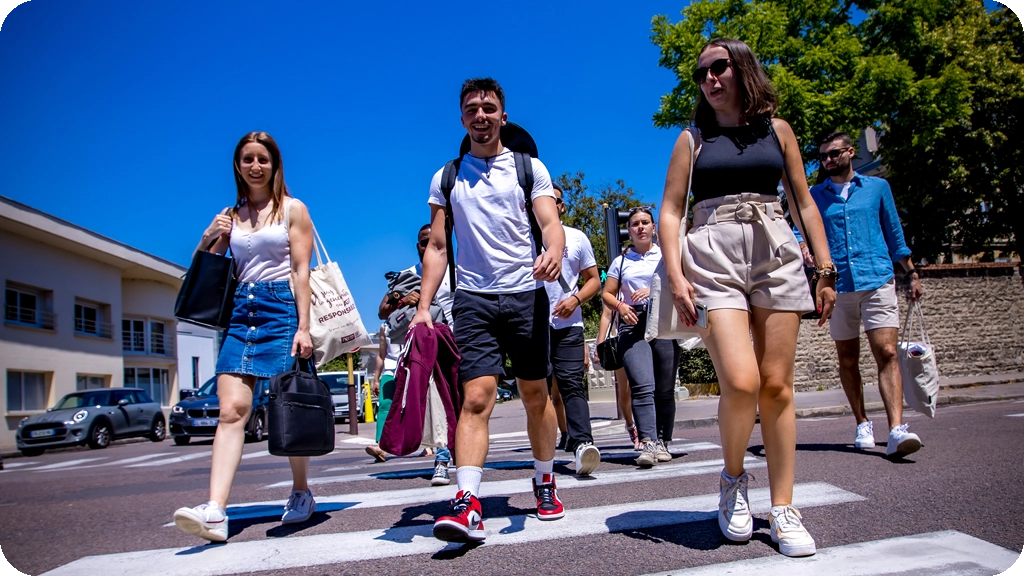Alternating leave: how many days and how to apply them?

Holidays and work-study programs: a real headache for students? If you are a work-study student in business school, you have surely already asked yourself How many vacation days can you take, when and how to organize them. Unlike students in classical education, you do not have school vacations strictly speaking, but you do have rights as an employee.
5 weeks of paid vacation? 5 days to review? RTT, public holidays... What is the difference between paid leave and review leave? Can you take leave from the start of your contract? What are your rights and how can you use them intelligently? Poorly anticipated, these rest days can be a source of stress, well managed, they can allow you to optimize your professional and academic career.
In this article, we take stock of Alternating holidays, their specificities and the best strategies to optimize them.
Work-study paid leave: what are your rights?
When we Start an alternation, we often ask ourselves the question of holidays. Are we entitled to the same rest days as a traditional employee? How to install them without impacting your contract? These questions are legitimate, because unlike students in classical education, you do not have school vacations strictly speaking. Your leave is governed by the Labor Code and the rules of your host company.

Is a work-study student entitled to paid leave?
Yes, a work-study student benefits the same paid leave as a traditional employee. It accumulates 2.5 working days of paid vacation per month, or 30 working days (5 weeks) per year if working full time. This calculation is the same whether you are on an apprenticeship contract or a professionalization contract.
Unlike students in initial training, The work-study students do not follow the school vacation calendar. Their pace is based on that of the employees of the company that employs them.
However, these leaves are not available immediately. You the acquire gradually over the months. If you start your apprenticeship in September, you will only have accumulated 10 days off at the end of January, and not all of the 5 weeks per year. This can be a challenge if you want to take a vacation before you've accumulated enough rest days.
School leave vs. paid vacation: what's the difference?
One of the main pitfalls for apprentices is to Confusing school vacation with paid leave. By joining a work-study business school, you are leaving the traditional academic framework to enter that of paid work. Your business does not follow the academic calendar, and you have to take time off if you want to be absent.
For example, if your school closes for three weeks in August, you won't automatically be on vacation. If your business is operating during this time, you will need to be present there., unless you have registered and validated your leave with your employer. Conversely, if your business closes at the end of the year, you must use your vacation days during this period, even if your school remains open.
This reality requires a rigorous organization. It is essential toanticipating and to communicate with your employer to avoid any unpleasant surprises.

How do you take your leave alternately?
A work-study student must ask for the agreement of your employer before taking leave. It is recommended to Make your request several weeks in advance to avoid a refusal.
Holidays are generally asked in writing or via internal HR management tools. Some businesses impose fixed vacation periods (e.g.: closure in August), which can limit flexibility to pose for days freely.
Each organization has its own rules and busy periods, where time off may be restricted..
Another point to watch out for is the Fractionation of leave. Some businesses require taking leave in several periods rather than in a single block of five weeks. You will therefore not necessarily be able to put down all of your days at once..
📌 At BSB, we support our students in their search for an apprenticeship, but also in the management of their professional career thanks to the device Pathfinder. Learning to organize your leave is part of the information you need to understand in order to succeed in your apprenticeship and avoid any tension with your employer. By anticipating and structuring your request, you ensure that you enjoy your rest without impacting your contract.
Specific leave for work-study students: revision, public holidays and RTT
Work-study students are entitled to conventional paid leave, but some specific arrangements are added to these days of rest. Between The 5 days of leave for revision, the public holidays and the RTT, it is essential to understand what you are eligible for and how to benefit from it.
5 days off for revision: how does it work?
A work-study student on an apprenticeship contract benefits from 5 additional vacation days to prepare for exams. These days, granted by the Labor Code, must be taken in the month preceding the tests. They are paid and do not come as a deduction from conventional paid leave.
However, these days are not automatically assigned. It is up to you to ask your employer for them, specifying the dates of your exams. Proof from your school may be required to validate the request. It is better to anticipate to avoid any refusal or conflict with the company.
Public holidays and RTT: what are the alternating impacts?
Are public holidays automatically non-working alternately? Not necessarily. It all depends on the collective agreement and company practices.
- If the company grants the public holiday to traditional employees, work-study students also benefit from it.
- If the company is working during a holiday, you must be present unless your contract says otherwise.
On the other hand, if you work on a public holiday, it can be recovered or give the right to an increase in salary, according to the rules in force.
💡 Tip: Anticipate these situations and ask your employer how public holidays are managed as soon as you arrive alternately.
Concerning the RTT (Reduction of Working Time), not all apprentices have access to it. These additional days of rest concern employees subject to a day package or to a working time greater than 35 hours per week. If your contract includes exactly 35 hours per week, you will not benefit from RTT.
However, some companies apply internal agreements allowing work-study students to benefit from compensation in the event of flexible hours. Ask your HR department the question to clarify your situation.
Early leave: is it possible to work in alternation?
Early leave allows you to take days off before you have acquired them. Alternating, this remains a possibility, but only with the agreement of the employer. Some recruiters agree to grant leave in advance, especially at the start of the contract, when the work-study student has not yet accumulated enough rest days.
However, this early leave can be subtracted from the days accumulated thereafter. For example, if you take 10 days at the start of the contract and you have only accumulated 5 days, you will have a “negative balance” to make up for in the following months.
If you need to take early leave for a particular reason (planned trip, family event), clearly explain your request to your employer and offer an arrangement to make up for your absence.
📌 Managing your leave alternately is not simply counting your rest days. It is also knowing juggling the specificities of your contract and optimize these periods for do not impact your work in business. Les BSB apprenticeship career coaches make our students aware of these aspects so that they can address their work-study experience calmly and professionally.
What happens to paid leave at the end of the work-study contract?
When your work-study contract is coming to an end, a question arises: What happens to the time off you didn't take? Unlike employees on a permanent contract, work-study students must manage their leave balance according to the limited duration of their contract. Do you have to put them down before the end? Are they lost? Can they be compensated or deferred if you are hired?
Can a work-study student get paid for unused leave?
Yes. If a work-study student has not used all his leave at the end of his contract, he must receive compensatory compensation on his last pay slip. This benefit is calculated based on the number of days left and the gross salary.
For example, if you leave your company with 5 days of unused vacation, you will receive an amount corresponding to 5 days of work on your last pay slip.
Attention, if you have taken more leave than you have earned, your employer may require a deduction from your last salary, unless an agreement has been reached beforehand.
What happens to leave if you are hired on a permanent contract?
If your work-study program leads to a permanent contract in the same company, your unused leave is not lost. They are simply carried forward and integrated into your new contract. You can then ask them like any employee on a permanent contract.
However, it is important to clarify this transition with your employer to avoid confusion. Some work-study contracts provide for specific rules on the management of leave in the event of hiring, in particular on the deferral of the remaining days.
If your company does not hire you at the end of your apprenticeship, make sure that your balance of any account includes compensation for your unused leave. An oversight can happen, and it's always a good idea to check your pay slips before leaving your job.
The end of an apprenticeship contract is often a transition period, sometimes to a job, sometimes to a new opportunity elsewhere. Anticipating the management of your leave makes it possible to avoid any loss of acquired days and to ensure a smooth transition.
📌 Unsure about your vacation balance? Check your payslips and discuss them with your HR department before the end of your contract.

How to optimize your leave to boost your career in business school?
Beyond the simple right to rest, managing your work-study leave well can become a real lever for enriching your professional and academic career. Instead of just putting them down to breathe, why not Use them strategically to accelerate your career ?
Plan your time off to participate in professional events
In some sectors, attending trade shows, conferences or hackathons can be a considerable asset. These events are unique opportunities for meet recruiters, expand your network and stay up to date with market trends.
If you are in Apprenticeship in marketing, why not take a day to go to Big Data & AI Paris Or at E-marketing fair ? In finance, events like Patrimonia or AM Tech Day can allow you to exchange with professionals and to enrich your vision of the sector.
In these cases, properly preparing your leave request is essential. Present your project to your manager and explain how participating in this event can be beneficial, not only for you, but also for the company. A proactive and committed work-study student will always be better perceived.
Take advantage of your leave to develop your skills
An apprenticeship year is intense, between the requirements of the school and those of the company. However, it is sometimes difficult to take a step back and deepen certain essential skills for your future career.
Use a few days off to pass a certification, follow a short training course or even improve your skills on a business tool can be a great investment.
Here are some examples of training that can make a difference on a resume:
- Google Ads or Google Analytics for digital marketing students.
- Advanced Excel or Power BI for financial futures.
- Project management certifications (Prince2, Agile, Scrum Master) for management profiles.
- TOEIC or TOEFL to boost your English level and your credibility internationally.
Some businesses may even finance these courses if they are relevant to your position. Check with your HR department before taking your leave.
Manage your leave to maximize your productivity and well-being
An apprenticeship can be demanding, especially in business school where students juggle courses, projects and corporate missions. Taking time off at the right time can help avoid exhaustion and maintain an efficient pace of work over the long term.
Instead of setting days at random, it may be a good idea to:
- Take a break after an intense period, like the end of a major project or an academic sprint.
- Avoid accumulating too much fatigue at the end of the year by intelligently allocating your leave.
- Take advantage of a drop in business activity to take a few days without impacting the team.
Good leave management also shows your ability to plan and organize your work, a quality that is particularly appreciated by recruiters looking for business school students.
📌 Managing your vacation is not limited to counting your remaining days. It is also an opportunity to stand out, to develop skills and to optimize your professional career. At BSB, we encourage our students to take a strategic approach to maximize their work-study experience and make the most of it for their future career.
FAQ — Answers to frequently asked questions about alternating leave
Do you still have questions about your work-study leave? Here are answers to the most frequently asked questions from business school students.
What are the paid alternating holidays?
An alternating student accumulates 2.5 working days of paid vacation per month worked, or 5 weeks per year. These days can be set after validation by the employer, as for any employee. However, they do not follow Not the school vacation calendar and should be planned according to the needs of the business.
What are alternating special and family leaves?
In addition to traditional paid leave, a work-study student can benefit from days off for family events, according to the law and collective agreements.
Here are the main exceptional holidays available on an alternating basis:
- Marriage or PACS : 4 days.
- Marriage of a child : 1 day.
- Birth or adoption of a child : 3 days.
- Death of a loved one (spouse, parent, child, brother or sister, grandparents) : between 1 and 5 days depending on the family relationship.
- Parental leave or paternity leave : accessible under certain conditions.
These leaves are granted without seniority conditions and are not deducted from paid leave. You must inform your employer and provide supporting documentation (marriage certificate, death certificate, etc.).
How to request leave in case of termination of the work-study contract?
If your contract ends before you have taken all your leave, you must be compensated for the days not taken. This compensation is calculated on the basis of your gross salary and appears on your last pay slip. Think of check your leave balance before the end of the contract and to discuss it with your employer.
Are students entitled to alternating school holidays?
No Unlike students in initial training, work-study students do not benefit from school vacations. Leave must be taken as for any employee, in agreement with the company. If your school closes during the summer but your business remains open, you should continue to work unless you take time off..
How do I request paid leave with the work-study schedule?
Alternation imposes a particular rhythm between school and business, which makes leave management more difficult. The ideal is to plan your leave taking into account your periods at work and to anticipate the request from your employer. Some contracts provide for specific rules to harmonize leave periods with the school rhythm, but this is at the discretion of the company.
What happens to my leave if my work-study contract ends at the end of the year?
If your work-study contract comes to an end, You must pay off your leave before you leave or be compensated for those you did not take. If your company hires you on a permanent contract, your leave not taken may be carried over to your new contract. Check with your employer how your leave balance will be managed.
Managing work-study leave may seem complex, but good organization helps avoid unpleasant surprises. Understanding your rights and anticipating your requests makes it possible to effectively reconcile work, training and rest.
Manage your work-study leave for a better professional experience
Co-op leave is often misunderstood, but managing it well is one of the essential professional skills. Unlike classically trained students, you should plan your rest days taking into account the imperatives of your business.
In summary, here's what you need to remember:
- You are entitled to 5 weeks of paid vacation per year, but they are not aligned with the school vacation.
- Leave must be early and validated by the employer to avoid rejections.
- The 5 days of leave for revision are a right, but must be requested in the month prior to the exams.
- At the end of the contract, leave not taken is compensated or postponed if you are hired on a permanent contract.
Managing your leave intelligently also means optimizing your work-study program. You can use these days to attend professional events, develop new skills, or simply maintain your balance between study and work.
You want to continue with a Bachelor in Management (3rd year) or a Master Grande Ecole (work-study program) ? Download our work-study brochure to help you get a contract in a company that matches your profile and career path.





To remember